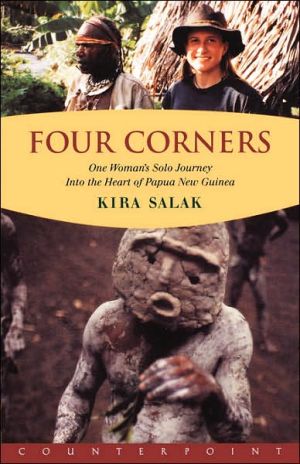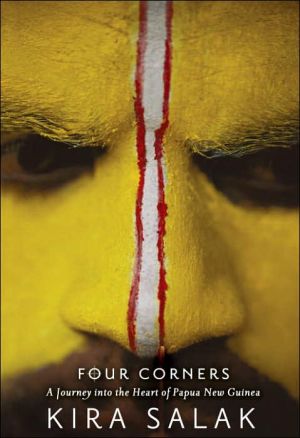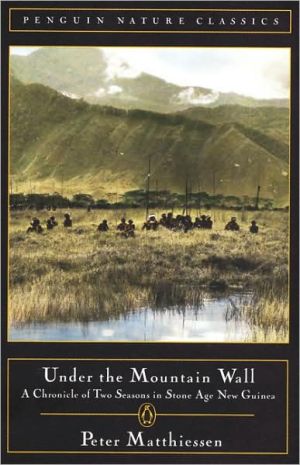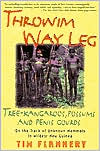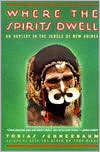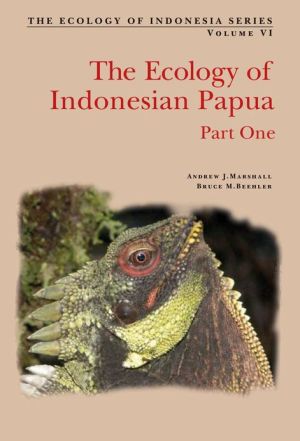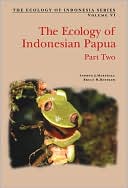Four Corners: Into the Heart of New Guinea: One Woman's Solo Journey
A story of extraordinary danger and adventure as a very young woman attempts, alone, a trip across Papua New Guinea.\ After her first taste of the freedom found in travel at age nineteen, Kira Salak spent the next several years of her youth as a constant, impulsive traveler. Barely old enough to drink, she leaves her life behind-graduate school, a job, a boyfriend who loves her-to attempt the impossible, her dream of following in the footsteps of British explorer Ivan Champion, the first...
Search in google:
At age 20 Salak set off to become the first European women to traverse the South Pacific Island. In present-tense, journal-style only without any dates, she recounts the geographical journey and personal awakening. There is no scholarly paraphernalia. Annotation © Book News, Inc., Portland, OR Publishers Weekly In this gripping adventure story, Salak, a graduate student in her 20s, describes a recent trip she took to remote, tropical Papua New Guinea, in the Pacific. Salak retraced the steps of British explorer Ivan Champion who, in 1927, traversed New Guinea and Papua via the Fly River, hiking the highlands and ascending the Sepik River. Solo travelers in this country are rare because of the difficulty of navigating swamps, jungle terrain and mountain trails as well as dealing with torrential rains and relentless mosquitoes. In addition, there is a high crime rate; poor young men leave their tribal homelands, flock to the city of Port Moresby in search of wealth, and wind up stealing from whomever they can. No stranger to harrowing journeys, Salak has sought out exotic locales since her teens and recounts here how she was nearly raped in Mozambique. As well as detailing her trip, she ruminates on her unquenchable appetite for danger and recalls a childhood spent in a truly dysfunctional family. Amid the breathtaking landscapes and wildlife of Papua New Guinea, Salak daily tested her physical endurance. She encountered a variety of both friendly and indifferent tribal peoples and talked with Pastor Carl, the leader of a guerrilla band fighting the Indonesian takeover of Western New Guinea. Salak has not only achieved her goal of crossing Papua New Guinea, but also her lifelong dream of authorship with this consistently interesting and well-written memoir. (Nov. 1) Copyright 2001 Cahners Business Information.
\ \ \ \ Chapter One\ \ \ Where Do We Come From? What Are We?\ Where Are We Going?\ \ \ \ My trip began in paradise. In Tahiti. It was one week before the French nuclear tests on the Mururoa atoll, one week before protestors' riots and looting ripped apart the Tahitian capital, Papeete. I saw none of that coming. I had never been to a more peaceful place.\ I was staying in a youth hostel, and it wasn't long before a grubby group of us invaded the Hyatt Regency Hotel, occupying the terrace restaurant and securing seats overlooking the sea. We wanted to improve on our view. We wanted beer nuts and cocktails at eight dollars a shot, and the feeling of life being as close to perfect as it could ever be.\ It came close that night. A magnificent South Pacific sunset graced our efforts. Gilded waves, a blazing sky containing every shade of red imaginable. We gaped at the west, our eyes never leaving it as we talked lazily about many things. Why Americans never travel anywhere. Why Germans always do. Didn't Marlon Brando have an island somewhere around there? Didn't his daughter kill herself? We all looked over at the dreadlocked Brit who asked this last question and admonished him with our gazes: inappropriate subject. We would not tolerate such questions. Not now. Not in front of such perfection.\ Every day in Tahiti ended with sentimental perfection, as if it were always the last day before the end of the world. Beauty was ostentatious there. The air reeked of tiare and orange blossoms like aland wearing too much perfume; walking the streets meant treading on flowers shed like autumnal leaves. I wondered absently when I'd be dropped to earth again, a mortal. Too soon, surely. And I wasn't yet prepared for the sobering jolt.\ The quietest of the group, I was surprised when the others joined me in silence. To the west, the night was taking over, creating an edge to the colors and slowly blowing out the scene. Mauve. Dark maroon. Slowly, slowly. The sky and sea joining. A slice of moon asserting itself. The sounds of insects. A cooler ocean breeze.\ And night.\ Something akin to disappointment overtook us. The beers and cocktails became much too expensive for us. The Hyatt Regency Hotel too stuffy. We counted out our loose change, piled it on the table, and left to the relief of the hotel staff.\ Heading to the youth hostel with everyone in the back of an old truck, I felt like one of Tahiti's tupapau—ghosts—which people believed wandered endlessly and could only be persuaded to rest by lighting a kerosene lamp in the night. I was already feeling anxious to leave Tahiti. Inexplicably, I always needed to be somewhere else. I'd left behind so much this time. Graduate school, my teaching job, my chance at having some savings. A boyfriend who loved me and whom I might have allowed myself to love back.\ The stars above, for all of the truck's speed, didn't seem to move. The wind lashed our hair back, sent our clothes beating upon us. Tahiti and its people appeared in glimpses of light: an old man walking beneath a street lamp, a pale ocean, a mother on her front stoop calling to a child.\ I looked at the young people around me. Most of them had been in Tahiti for months, glorying like Fletcher Christian's mutineers in how successfully they had evaded the rest of the world and its responsibilities. They lived, as I did, out of a backpack. They spent their nights getting Polynesian tattoos and drinking beer around bonfires on the sand, a society of merry vagabonds. I was always tentative about joining them, sitting on the fringe of the circle of light like one of H. G. Wells's morlocks. I liked to watch them, wondering what happened when paradise officially became one's home. Did the escapes stop then? Did one live a charmed life? For their lives, these happy people's, indeed seemed charmed.\ I'd found that the most paradisiacal places in the world only distracted me for a few blessed days. It was like having an out-of-body experience: I stepped away from myself and my past, and resided in turquoise waters and white sands, pretending I wouldn't ever have to return to anything. Rest and relaxation, people called it. I called it hope.\ My favorite artist, Paul Gauguin, never did return home. He had decided to exile himself in French Polynesia. Ironically, the South Pacific nearly killed him with its beauty: It had no interest in accommodating sour moods with dull, gray days or cold nights. Often on the verge of suicide, Gauguin was forced to greet the daily mockery of a blooming, verdant land always busily engaged in cycles of rebirth. Such a paradise was then, as it is now, a place where only the most important, the most fundamental questions could be asked. Gauguin asked them in one of his masterpieces, a painting that—had he not botched a suicide attempt—would have been his last:\ \ \ D'où venons-nous? Que sommes-nous? Où allons-nous? Where Do We Come From? What Are We? Where Are We Going?\ \ \ * * *\ In the youth hostel that night, Coco was telling me how nice the bodies of young women are. So soft, he said. So firm. He smeared coconut oil on my back, then warmed his hands over a kerosene lamp. He told me he could give Tahitian massages all day to young women like me, and I believed him because he was a lonely man. His wife had been living in the United States for the past two years, and he had the dazed, frazzled look of a middle-aged man who has kept company with ghosts.\ Coco owned the hostel, dividing his time between running it and seducing the female clientele. He talked openly about some of his past "friends": a young Swiss woman whom he'd hired to make airport runs for him, a Danish woman, a number of French girls. But never an American, he announced, as if I were already on his list. He said he liked foreign women because of their variety, and claimed he could expect different responses from each of them when he gave them massages.\ "And what are Americans like?" I asked.\ "Nervous."\ I laughed. "Am I nervous?"\ "Your whole back is stiff. You don't like to be touched down here." He grazed my thighs with the back of his hand.\ "My boyfriend used to touch me there all the time."\ "A lucky man," he said in French. "And where is this boyfriend now?"\ I saw, James again, his kind, determined smile. The play of desire always in his eyes.\ "Au revoir." I cut the air with my hand. "Good-bye."\ Coco tskked. "Not so lucky then, n'est-ce pas?"\ I changed the subject. Did Coco just give massages? Nothing else? I wanted him to know that I wasn't looking for anything else.\ Only massages. He told me about his Swiss "friend" again. She would come back late from the airport and couldn't go to sleep without one of his massages. They were that good.\ "A wizard," I said in French, smirking, and then his hands were on my back, smearing the coconut oil in. When his hand ran up my thighs, I said, "Only a massage."\ He chuckled. "You Americans."\ I looked out the window of Coco's room. We were near the beach and the sound of the surf reminded me of where I was, though I felt as if I could have been anywhere. Sometimes—particularly at night—all places blended into each other and I became disoriented. These were the times when I panicked and made sure my room's doors and windows were locked, and I slept with a light on. Or, if I was in a hostel in some country somewhere, I'd roll over to look at the sleeping forms of the other people. I'd listen to their breathing, the easy rhythms, waiting for the air to smell as it should again. Like Zanzibar, perhaps, thick, dank, sweet. Like Nepal, Bangladesh. The beating of a fan overhead, maybe. Or rain pounding through trees. The world returning, telling me where I was again.\ Coco brought me back this time. When he got up to prepare more oil for my massage, I watched him. He was not just big but colossal, a giant. Long, thick arms. Heavy Polynesian cheekbones. His whole body bristling as he poured oil in his hands and worked them over the top of a small kerosene lamp.\ This was his specialty, he explained. These massages. He'd learned from his father. His father had learned from his father before him. It was an art. A gift. Learning how to move the hands just right. Maintaining balance with each motion, the body a canvas.\ Coco dripped more coconut oil on me and his hands again arrived hot from the kerosene lamp to knead my skin. My eyes stayed focused on the lamp's fluttering shadow on the window's curtain. The surf rushed, retreated into the room's silence. Coco became a ghost: I felt only his hands rolling and pressing. Whatever it was he was doing, it became another kind of perfection. A forbidden one. A fantastic one.\ He asked how long I planned to stay in Tahiti.\ "Not long," I said. "This is a stopover. I'm going to Papua New Guinea."\ "You're going there on holiday?"\ I felt the press of his fingers on my thighs. "No," I said.\ "What will you do there?"\ "I don't know yet."\ He tskked. "I hear it's not safe."\ I turned over and looked at him. "Yeah. Well, no place is. No place on earth."\ He turned me back around. "Here it is safe."\ But I wasn't convinced of that, either. I didn't feel safe, even within the confines of his four walls, with his strong hands on me.\ Coco's hands moved up to my shoulders, massaged the back of my neck.\ "Your neck is very stiff."\ "I know."\ He pressed hard into the tight muscles. I winced and started to protest.\ "Shh," he said. He said it softly, drawing out the sound, kneading my shoulders, my back. Again, his fingers ran down my thighs. I rolled over, anxious.\ "I think you should stop."\ He considered me. "Does it feel good, what I'm doing?"\ I looked away.\ He rested a hand on my leg and told me to watch what he was doing. The fingers smoothed across my skin in a single, deliberate movement. "A Tahitian massage is special. It's about touch."\ I sighed and shut my eyes. Coco started to tell me his theory about me. He said I don't let many people touch me. His fingers traveled up my back. He said that I've probably never been in love.\ Outside, the other backpackers at the hostel were gathered around a bonfire on the sand and I could hear them laughing.\ "I think I scare you," he said.\ It hadn't occurred to me that I was scared.\ "You're scared of me," he said, "because I'm touching you like this. Shall I stop?"\ Part of me didn't want him to stop. Part of me wanted to be in someone else's care. This was such a rare feeling—I was used to traveling the world alone, taking care of myself. No matter what, I needed to be able to take care of myself. Growing up, I had learned to rely on no one.\ Yet, maybe I could deliver myself over to him, ii only for a night. Though he was a stranger, I wanted to tell him how his paradise of Tahiti scared me more than his touch. I didn't trust the perfection of it. Such free and benevolent beauty surely came with a price. How to pay for this reward of sunsets and surf, and the numbing smell of hibiscus and tiare? How is it that I had won this all without effort? I felt as if I were being drugged and deceived, and that it would all be taken away in a second. I didn't know how to enjoy it fast enough, if I even deserved to enjoy it at all.\ My nakedness suddenly felt like a veil around me. Coco sat on the corner of the bed, studying me. I was shivering and threw my shirt on, getting up. Coco attentively watched me, smiling.\ "Tu as peur," he said. "I scare you."\ I heard more laughs from outside, around the bonfire. I went to the door and told him I had to go.\ This man knew me: "You always go, non?"\ \ \ * * *\ \ \ I always needed to be gone.\ It was as a kid that I first got the idea that the world I wanted, and couldn't seem to find, lay elsewhere. It was just a matter of getting there, somehow. Of having the strength and determination to find it.\ In my family, strength and determination meant everything. Independence and resiliency were virtues my parents cultivated at all costs. They'd had no tolerance of any behavior that might be thought to show weakness or vulnerability. No physical fragility allowed, no sacrificing anything to others, no outward expressions of love. Ours wasn't a hugging, touching family. We were like a family of strangers inhabiting the same space, crossing paths, yet always convinced of our inherent aloneness. My parents rarely celebrated holidays, as if the mere act of celebrating, of sharing anything together, was too foreign and frightening a prospect. Consequently, there weren't birthday or graduation parties. Virtually no outings. With the exception of a trip out West, vacations were almost always too expensive; amusement parks, a waste of time. I was taught that the families who did those kinds of activities were just the ridiculous toadies of popular culture. We were supposed to be different.\ Instead, my father would take me to the firing range. I'd been eleven when I'd fired my first gun. A Walther P-38. I liked it; it had a nice kick. I remember standing in the booth, a lanky blonde-haired girl in pigtails and glasses, with the P-38 aimed at the figure target at the other end of the room.\ "Between the eyes," my father said from behind me. I could barely hold up the gun with both hands. "Steady, and get 'im between the eyes."\ I got him. Twice. Between the eyes. The third bullet grazed the imaginary shoulder. My father, ecstatic, went to the booth next door to tell the two men standing there that his daughter could shoot better than the boys. His enthusiasm told me that here, finally, was something I was good at. Finally.\ Not that I was bad at everything else. Rather, I was an overachiever in the classic sense: A's throughout elementary school; excellent in sports; studious and polite, almost to a fault. But all of this seemed to pale beside my brother, Marc, who was two years older and had a genius IQ of 158, excelling at just about everything. If I was good at something, Marc was inevitably better—or so I was led to believe by my family and friends. My parents decided to put my brother in private school from the second grade on. (I, on the other hand, would Stay in public school.) After all, Marc was the beneficiary of my family's most important expectations—he was to be carefully, meticulously groomed for the Ivy League, We were a lower-middle-class family, my mother a waitress, but my parents took out a second mortgage on the house to pay for his "rich man's education" at the private schools. Marc was going to a New England boarding school, by God. And he went. To one of the most prestigious ones, out in Connecticut. He later ended up at Cornell. All according to plan.\ As a kid, I never stopped feeling like the consolation prize contestants win on game shows; something people don't really need but are still required to graciously accept. This feeling made me try all the harder for the recognition that would never come. If one academic achievement wasn't enough, well, maybe the next one would work. Or the next. Maybe I would finally be noticed for something. I soon started to think that the problem lay in who I was. If I were only smarter, more talented or creative, I could stand ground against my brother, and my parents would send me on to private school, too, and have the same expectations for me. Then it occurred to me that if I changed, became someone else altogether, I might be able to fix everything.\ I'd been writing stories since I was six years old, and I saw in my writing my first chance to escape and become someone else, someone better. When I was nine, I put together a file box filled with scribbled notes describing scenes and places in the world. It was a special box—no one could get near it because inside were my adventures. It contained lengthy descriptions of who I'd become for the day, and I could constantly reinvent myself. I'd turn into a soldier or explorer, a medicine woman or empress, possessing the fantastic strengths and abilities of each of these roles so that it was disappointing to return to my real self. In my imaginary adventures, I was in full control of my life. I was able to plan what characters I'd encounter, what journeys I'd have, what marvels I'd accomplish. Sometimes the places I chose never existed, were fantasy lands like something out of a Tolkien novel. More often, they were from the past. I lived in a nondescript suburb of Chicago that offered little in the way of adventure, but I was always reading National Geographic and watching PBS documentaries. At school, I carried around a notebook in which I wrote the scenes of adventures so I could playact them by myself at home. My summers were spent in heady excitement over where my make-believe would take me next. One day I might be in the Great Plains, the next day Mesopotamia, the Andes ... New Guinea.\ New Guinea was, by far, my favorite place. It was a land of ferocious headhunters (whom I always managed to befriend) and jungles full of man-eating crocodiles and tribes of people who built huts in the trees and lived on jungle fruit, insects, wild boar. Even back then, though, New Guinea had seemed foreboding. It always sat on the very edge of my imagination, both fascinating and ominous, like a mysterious temple I was forbidden to enter. If I could get through the jungles of my imaginary New Guinea, I'd reason, I could do anything.\ These imaginary journeys soon took the place of the company of other people, as I avoided nearly everyone: I had, simply, a debilitating shyness. It was due in large part to an increasing lack of self-confidence, a feeling that anything that came out of my mouth was worthless and unimportant; there was nothing I could say or do that would impress anyone. The shyness got worse as I grew older—the anxiety and tightness in my chest, the fear of condemning myself through words. Conversation itself seemed a strange, laborious ritual with rules that constantly eluded me. I was terrified of stuttering out something stupid or, worse, incoherent. Gradually, I just gave up and withdrew from people. If put in their company, I became mute. Silence meant safety. It meant anonymity. No one could get near me.\ It had been those early file-box stories that introduced me to the idea of actually making some arduous journey, miraculously becoming someone else by the end of it. As a kid, I knew that my extreme shyness made me different somehow, an oddity, like someone who had a mysterious medical condition the doctors couldn't treat. My peers at school, not understanding the reasons for my avoiding them, attacked and ridiculed me. After a particularly bad year of junior high school, my mother had to put me in a new school, but by that time the damage had been done. Not only did I hardly talk to anyone, but I could find no convincing reason why I should. My file box and its stories became more important than ever now. I could become anyone I wanted, and I could always leave for a different world. A better world.\ When I turned thirteen, my parents sent me as a scholarship/work-study student to boarding school in Wisconsin, where it was hoped I would "come out of my shell." But life at Wayland Academy was regimented and uneventful, and did little to help. I found myself waking up each day wondering what I could possibly do that would mean anything. I felt like a carnival horse going around and around, futilely bobbing up and down to the same old music, never destined to arrive anywhere. Never destined to stop. Except for weekends, every hour of every day was allotted for something: chapel, classes, dining hall, study hall, sports. Sports were mandatory. I said I liked to run, and was put on the cross-country team.\ Sometimes our lives are chosen for us, and we have about as much control over the matter as we do the situation we're born into. If I had hoped for a new identity, a way beyond the silence and the self-loathing, I hadn't intended on running to be my way out. Running was a strange, unwanted gift. My body, quite unexpectedly, won races for me. It won the Conference meet. Went on to win the State meet. When my coach told me I was one of the top-twenty high school runners in the country, I felt as if I'd stumbled upon an identity I couldn't refund. Suddenly there was talk of national competition, the Olympics. Colleges wrote promising full scholarships—all I had to do was run for them. I had gone from being a sort of phantom sitting at the table in the corner of the dining hall, to the Runner noticed by everyone, particularly my parents. My father drove up to Wisconsin to attend my running meets, video camera in hand. My mother showed off newspaper clippings to her friends in which a young girl in braces smiles reluctantly from a photo, the headline above reading, "Wayland Harrier Wins State."\ The pressure became incredible, the demands of the new identity stifling. The file-box stories from my childhood seemed silly and worthless now. I couldn't go to any of those places; my life didn't feel my own anymore. When I woke up, I relinquished my days to the expectations of the people who now noticed and relied on me. I lived for parents, coaches, teachers, college sports recruiters with their whispers about the Olympics. I lived to beat record times, to beat other people—to always win, no matter what. To not win a race was to risk returning to the person I'd been before, and this became a terrifying incentive to keep going.\ Yet, I began to hate what I had become. Trapped in all the unwanted expectations, I had dreams of my legs suddenly breaking. I contemplated running into cars, failing off cliffs—whatever, as long as I had an excuse to never run again. After setting the state record in the mile, I went to my dormitory room, locked the door and tried desperately to break my legs with a piece of pipe. That they wouldn't break, that they refused to respond at all to my blows, didn't discourage me. If I persevered, pretended I was, say, a Green Beret from one of my childhood adventures who could ignore the pain, maybe I'd get lucky. Maybe a bone would fracture. Something. And then I could stop running. It'd be over.\ Nothing broke. My legs were bruised, but the pain had been too great: I'd been too much of a coward. Desperate and suicidal now, I decided to just quit. It was the hardest thing I'd ever done, worse than running in the most demanding of the races, worse than the specter of my actually losing a race. To this day I don't know where I got the courage to make that decision. The audacity of it! I felt as if I'd let down the entire world. All of the people pleased with the Runner I had become—parents, mentors, relatives—wanted to know what I would do with myself now. No more free rides to college. No more guarantees. Many prominent people in school, whose opinion I trusted implicitly, warned me that life only offered one shot at such glory. Surely nothing I could do in the future would match what I had given up.\ I ended up seeing a psychologist over the decision. It took an entire year of his ministrations before I was able to stop hearing everyone else's disappointment. I kept telling him what I'd secretly been telling myself ever since I was a kid: I wanted to be a writer. He suggested I tell my parents this, get it out in the open. I did. Predictably, they didn't understand. Writing? But what was the point? Could I ever have a future in that? To them, writing was a path with few—if any—guarantees, while running would offer me full college scholarships, newspaper write-ups, national competition, maybe even a chance at the Olympics. I saw that they had wanted the ease and convenience of living vicariously through my running successes, while there was no glory to be found in scribbling out stories. Writing was merely a "hobby," a quaint occupation that I stubbornly insisted upon pursuing. That I could ever be good at such a thing, that I could ever make any money or a career come of it, was utterly inconceivable to them. They were convinced that my true calling, my only calling, was running, and so writing was seen as a tragic waste of energy and time. What they didn't know, though, was that I did it as a kind of survival, as a way to keep going. It was not something I could suddenly stop doing at a moment's notice. It was not something that I could ever give up.\ (Continues...)\ \ \ Excerpted from Four Corners by Kira Salak. Copyright © 2001 by Kira Salak. Excerpted by permission. All rights reserved. No part of this excerpt may be reproduced or reprinted without permission in writing from the publisher. \ \ \ \
Prelude: Four CornersixPart One1 Where Do We Come From? What Are We? Where Are We Going?32 Independently, Without Prior Arrangements213 July, 1992—The Road to Tete, Mozambique334 Salvation of the Lost and Sinful675 Barbed Wire, Attack Dogs and Lessons in EmergencyResponse816 Bush Mary1097 Damsel in Distress1518 The Silent War181Part Two9 Long Way Too Much23910 Mozart and the Cockroaches26311 Hungarian Delights28312 Making Rain29913 Rafting the Sepik32514 Time Travel35315 Hands and Feet377Epilogue391Acknowledgments403
\ Publishers WeeklyIn this gripping adventure story, Salak, a graduate student in her 20s, describes a recent trip she took to remote, tropical Papua New Guinea, in the Pacific. Salak retraced the steps of British explorer Ivan Champion who, in 1927, traversed New Guinea and Papua via the Fly River, hiking the highlands and ascending the Sepik River. Solo travelers in this country are rare because of the difficulty of navigating swamps, jungle terrain and mountain trails as well as dealing with torrential rains and relentless mosquitoes. In addition, there is a high crime rate; poor young men leave their tribal homelands, flock to the city of Port Moresby in search of wealth, and wind up stealing from whomever they can. No stranger to harrowing journeys, Salak has sought out exotic locales since her teens and recounts here how she was nearly raped in Mozambique. As well as detailing her trip, she ruminates on her unquenchable appetite for danger and recalls a childhood spent in a truly dysfunctional family. Amid the breathtaking landscapes and wildlife of Papua New Guinea, Salak daily tested her physical endurance. She encountered a variety of both friendly and indifferent tribal peoples and talked with Pastor Carl, the leader of a guerrilla band fighting the Indonesian takeover of Western New Guinea. Salak has not only achieved her goal of crossing Papua New Guinea, but also her lifelong dream of authorship with this consistently interesting and well-written memoir. (Nov. 1) Copyright 2001 Cahners Business Information.\ \
